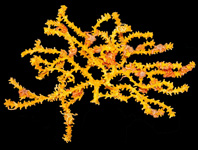Abstract
We characterized morphological variation among 172 specimens of Badis sp. (Teleostei: Badidae), collected from across Nepal and previously identified as Badis badis, to investigate whether any represented an undescribed species. Size-corrected principal component analysis (PCA), cluster analysis (CA), and discriminant analysis (DA) revealed four significantly different groups. One group was characterized by shallower body depth and shorter pelvic to anal distance than other groups and lacked a cleithral blotch. It was identified as Badis andrewraoi, previously unknown from Nepal, yet represented in our sample by 19 specimens from small rivers in the southeastern part of the country. Distribution of the remaining groups, all identified as B. badis, did not correspond to a zoogeographic hypothesis relating to major river drainages. Instead, morphological differences among these groups was better explained by allometric shifts. We provide information on the distribution and ecology of B. andrewraoi and B. badis in Nepal.
References
Barlow, G.W., Liem, K.F. & Wickler, W. (1968) Badidae, a new fish family—behavioral, osteological and developmental evidence. Journal of Zoology, London, 156 (4), 415–447.
https://doi.org/10.1111/j.1469-7998.1968.tb04363.x
Basumatary, S., Choudhury, H., Baishya, R.A., Sarma, D. & Vishwanath, W. (2016) Badis pancharatnaensis, a new percoid fish species from Brahmaputra River drainage, Assam, India (Teleostei: Badidae). Vertebrate Zoology, 66 (2), 151–156.
Bleeker, P. (1854) Nalezingen op de ichthyologische fauna van Bengalen en Hindostan. Verhandelingen van het Bataviaasch Genootschap van Kunsten en Wetenschappen, 25, 1–164.
Cummins, K.W. (1962) An evaluation of some techniques for the collection and analysis of benthic samples with special emphasis on lotic waters. American Midland Naturalist, 67 (2), 477–504.
https://doi.org/10.2307/2422722
Day, F. (1875) The Fishes of India; Being a Natural History of the Fishes Known to Inhabit the Seas and Freshwaters of India, Burma and Ceylon. B. Quaritch, London, 168 pp.
Edds, D.R. (1986a) Fishes of Royal Chitwan National Park. Journal of the Natural History Museum, Nepal, 10, 1–12.
Edds, D.R. (1986b) Fishes of the Kali Gandaki/Narayani River, Nepal. Journal of the National History Museum, Nepal, 10, 13–22.
Elliott, N.G, Haskard, K. & Koslow, J.A. (1995) Morphometric analysis of orange roughy (Hoplostethus atlanticus) off the continental slope of southern Australia. Journal of Fish Biology, 1995 (46), 202–220.
https://doi.org/10.1111/j.1095-8649.1995.tb05962.x
Geetakumari, K. & Vishwanath, W. (2010) Badis dibruensis, a new species (Teleostei: Badidae) from northeastern India. Journal of Threatened Taxa, 2 (1), 644–647.
https://doi.org/10.11609/jott.o2156.644-7
Hamilton, F. (1822) An Account of the Fishes found in the River Ganges and its Branches. Archibald Constable and Company, Edinburgh, 405 pp.
https://doi.org/10.5962/bhl.title.59540
Klausewitz, W. (1957) Neue Süßwasserfische aus Thailand. Senckenbergiana Biologica, 38 (3), 193–204.
Klingenberg, C.P. & Froese, R. (1991) A multivariate comparison of allometric growth patterns. Systematic Zoology, 40 (4), 410–419.
https://doi.org/10.2307/2992236
Kuhajda, B.R., Mayden, R.L. & Wood, R.M. (2007) Morphologic comparisons of hatchery-reared specimens of Scaphirhynchus albus, Scaphirhynchus platorynchus, and S. albus × S. platorynchus hybrids (Acipenseriformes: Acipenseridae). Journal of Applied Ichthyology, 23 (2007), 324–347.
https://doi.org/10.1111/j.1439-0426.2007.00884.x
Kullander, S.O. & Britz, R. (2002) Revision of the family Badidae (Teleostei: Perciformes), with description of a new genus and ten new species. Ichthyological Exploration of Freshwaters, 13 (4), 295–372.
Kuzmanović, N., Ŝinžar-Sekulić, J. & Lakuśić, D. (2012) Ecologically determined variation in leaf anatomical traits of Sesleria rigida (Poaceae) in Serbia–Multivariate morphometric evidence. Folia Geobotanica, 47 (1), 41–57.
https://doi.org/10.1007/s12224-011-9104-y
McGarigal, K., Cushman, S. & Stafford, S. (2000) Multivariate Statistics for Wildlife and Ecology Research. Springer-Verlag, New York, 283 pp.
https://doi.org/10.1007/978-1-4612-1288-1
Rao, C. (1964) The use and interpretation of principal component analysis in applied research. Sankhya: The Indian Journal of Statistics, 26 (4), 329–358.
Rice, W.R. (1989) Analyzing tables of statistical tests. Evolution, 43 (1), 223–225.
https://doi.org/10.1111/j.1558-5646.1989.tb04220.x
Ruber, L., Britz, R., Kullander, S. & Zardoya, R. (2004) Evolutionary and biogeographic patterns of the Badidae (Teleostei: Perciformes) inferred from mitochondrial and nuclear DNA sequence data. Molecular Phylogenetics and Evolution, 32 (2004), 1010–1022.
https://doi.org/10.1016/j.ympev.2004.04.020
Ruiz-Campos, G., Sánchez-Gonzáles, S., Mayden, R.L. & Varela-Romero, A. (2016) Meristic and morphometric comparison of an undescribed sucker of the Río Culiacán (Catostomus sp.) and Yaqui sucker (Catostomus bernardini) (Catostomidae, Teleostei) from the Sierra Madre Occidental, Mexico. Revista Mexicana de Biodiversidad, 87 (2016), 380–389.
https://doi.org/10.1016/j.rmb.2015.11.004
SAS Institute Inc (2010) SAS/STAT® 9.22 User’s Guide. SAS Institute Inc., Cary, North Carolina, 152 pp.
Shaw, G.E. & Shebbeare, E.O. (1937) The fishes of northern Bengal. Journal of the Royal Asiatic Society of Bengal, Science, 3 (1), 1–137.
Strauss, R.E. & Bond, C.E. (1990) Taxonomic Methods: Morphology. In: Schreck, B. & Moyle, P. (Eds.), Methods for Fish Biology. American Fisheries Society, Bethesda, Maryland, pp. 109–140.
Summers, S.G., Kostecke, R.M. & Norman, G.L. (2006) Efficacy of trapping and shooting in removing breeding Brown-headed Cowbirds. Wildlife Society Bulletin, 34 (4), 1107–1112.
https://doi.org/10.2193/0091-7648(2006)34[1107:EOTASI]2.0.CO;2
Valdesalici, S. & van der Voort, S. (2015) Four new species of the Indo-Burmese genus Badis from West Bengal, India (Actinopterygii: Perciformes: Badidae). Zootaxa, 3985 (3), 391–408.
https://doi.org/10.11646/zootaxa.3985.3.4

